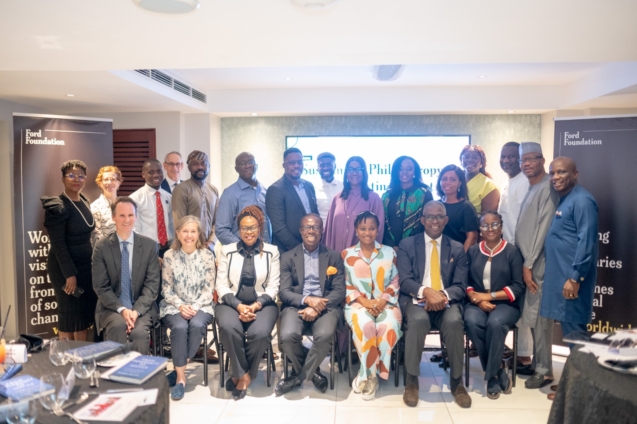The Ford Foundation hosted its maiden Quarterly Dialogue on Philanthropy in Nigeria event on Friday, October 27, 2023, organised by PricewaterhouseCoopers Limited (PwC).
The event’s theme focused on creating lasting impacts through sustainable philanthropy in discussion with local philanthropists.
With more events on the horizon, the purpose of these Quarterly Dialogues will be convening local philanthropists and high-net-worth individuals across Nigeria and in other West African states to participate in dialogues that would redefine local philanthropy and promote local funding of credible civil societies.
At the event, Ford Foundation’s West Africa Regional Director, Dr. ChiChi Aniagolu, has called on High Net Worth Individuals (HNWIs) in Nigeria and in the West African sub-region, to support local Civil Society Organisations (CSOs) in the face of dwindling financial funding from foreign governments and international partners.
Dr Aniagolu said as a result of recent significant declines in global funding, the very existence of CSOs, who provide support and services for local communities in education, human rights, and HIV awareness, among others, is threatened.
“The election of conservative governments in the West, amidst their unique national challenges, the COVID-19 pandemic coupled with various humanitarian war conflicts around the world, have drastically reduced donor funding to Nigeria and other West African countries.
“Yet, the needs for the interventions and services these CSOs address continue to rise as many Nigerians depend on them for support in their everyday lives,” she said.
Research and data show that Nigeria is amongst the ‘Big 5’ private wealth markets in Africa, with over 10,000 high-net-worth individuals (HNWIs) with a private wealth of $1 million or more.

However, efforts of their philanthropic works have been uncoordinated and not channelled through recognisable CSOs, which has therefore led to short-term reliefs rather than sustainable long-term change.
The rising class of Nigerian philanthropists could redefine the philanthropy landscape to drive homegrown development by supporting CSOs at the forefront of leading change efforts.
“The time is now. If CSOs do not identify other funding sources, the sector may significantly dwindle in the next 10 years or so. CSOs understand the communities they work in and have the experience and expertise to deliver development excellence.
“That has been our experience at the Ford Foundation. If local philanthropists don’t help to fill the gaps being left behind by development partners and even expand on them, our development challenges may get significantly worse in the coming years”, Dr. Aniagolu said.
President of the MacArthur Foundation John Palfrey also spoke at the Quarterly Dialogue event, saying that MacArthur was committed to ensuring that their contributions impacted society positively.
“At the MacArthur Foundation, scale impact doesn’t have to do with the organization going the whole hog all by itself. We leverage partners and collaborations, then create platforms such as ‘Levers of Change’ to build scale and impact. We are committed to delivering impact in a systematic way”, he said.
Participants in the dialogue discussed topics such as how local philanthropy can make more impact in society, challenges in getting funding, and how to achieve sustainability.
They identified key challenges working against sustainable philanthropic efforts such as inflation, stifling government policies and bureaucracies, lack of needs assessment, loss of monetary value in foundation endorsements, and lack of collaboration and synergy as well as duplication of efforts.
They agreed that getting founders and endowments to invest more, getting government buy-in and participation, public-private sector involvement, and working together will ensure the sustainability of local CSOs.
From the participants: “To ensure the sustainability of CSOs, we need partnerships and collaboration, innovative interventions, tax exemptions and incentives by the government to private companies to encourage and incentivise private philanthropy, advocate for the removal of tax exemptions from the discretion of executive ministers as well as build local capacity and community engagement to ensure the sustainability of the interventions” they said.
Latest Stories
-
Fuel prices to fall from June 16 due to postponement of GH¢1.0 levy
7 minutes -
PassionAir assures passengers after Kumasi–Accra flight encounters turbulence
1 hour -
Fatherhood Beyond Finances: Two drivers inspire a rethink on presence, bonding and recognition
1 hour -
President Mahama urges protection of fuel price gains amid Middle East tensions
2 hours -
Republic of Rogues: Where Thieves Have Heads and the System Has None
2 hours -
Musah Mohammed donates jerseys and footballs to youth teams in Nkawkaw
3 hours -
Omane Boamah urges youth to persevere, recounts dramatic admission struggle at POJOSS
3 hours -
Minority unhappy over suspension of fuel levy, demands full repeal
4 hours -
Helicopter carrying Hindu pilgrims crashes in India, killing seven people
4 hours -
Council of State member urges Ghana to localise global solutions for youth employment
4 hours -
CAS overturns FIFA ruling and awards Right to Dream development fees from Ernest Nuamah’s transfer
4 hours -
Hitz Praise Zone: Nii Noi launches new gospel show on Hitz FM
5 hours -
BOAD reaffirms commitment to energy transition and sustainable agriculture in West Africa
6 hours -
10 kinds of women who have denied men the joy of fatherhood
7 hours -
A father’s hurdles caring for son with Sickle Cell disease – John Dzido shares a fraction
7 hours

